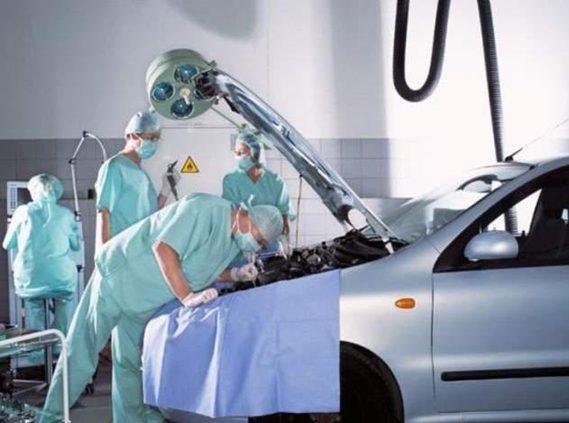
Your Body is Not a Machine, and I am Not a Mechanic.
(And we clinicians do not “fix” you.)
And if I could make the title longer: I do not treat with a “toolbox.” In fact, I’m nearly incompetent with anything more complex than a screwdriver and an Ikea desk, never mind the human body.
This idea came to me after a recent exchange with a patient. I had been treating her for about a month and she was frustrated with her continued struggle dealing with her back pain. Feeling debilitated she lamented that she didn’t think she would ever get better, and that she was completely crippled by her symptoms. She told me she couldn’t sleep, sit, or exercise without thinking about her back, and she didn’t understand why she wasn’t fixed and why no one knew “what’s wrong with her” (my quotations). In an email to her, I wrote the following:
“Your back will get better if you let it. Which means listening to it. Not pushing into pain, or getting yourself worked up, but finding things that are calming, and nourishing for your back. Like gentle swimming, variable movements, deep breathing. When it hurts, its a call to action to change whatever you're doing. When what you're doing feels good, its a call to action to do it more. You are in charge of yourself...not me, not an MRI machine, not an MD. Commit to this and see it through!”
She seemed to respond positively to this sense of empowerment I was trying to instill, and although it took a month for me to get there, I realized that I needed to start incorporating this language Day 1 of my patient interaction. Too often I get a sense of dependence from my patients. Dependence upon myself, their doctor, their surgeon, their radiograph, etc. instead of an ownership of their wellbeing. And looking back, I realize that I am probably guilty of fostering this exact dependence that I am trying to get rid of! How many times have I told someone “you need x, and you need to come here 2-3 times a week”. Patients come to us with expectations, and we feel obligated to meet them. Just like when I bring my car to the mechanic, I want to know the problem (diagnosis), solution (treatment), and cost (prognosis), and so do my patients. So we create different assessments and objective measures to figure out the problem and then manual interventions and exercises to “fix it.” But it perpetuates a belief that their body is made up of parts, instead of a whole complex system. And that if we can fix the part, we can fix the system. But shouldn’t it be the other way around?
As my own brain continues change, I have begun focusing my efforts on changing other’s. Movement and pain are both centrally driven, and so we must always start there. And yes, we are purported to be movement experts, so it makes sense to have a strong foundation in motor control. It does seem odd however, that we don’t strive to be known as pain experts as well, since that’s usually what brings people to us in the first place. Adriaan Louw posed a great question at the last BSMPG conference. He asked: Why do people come see us in pain, and leave as experts in biomechanics? Shouldn’t education, reduction of threat and locus of control be given to the patient during the first evaluation? Perhaps if we placed higher value on these things, we would be less enamored with building up our own toolbox, and focus instead on building one for our patients.
Chris Joyce is a curiously skeptical physical therapist working in an outpatient clinic in Boston. He can be reached at cjoyce@sportsandpt.com




